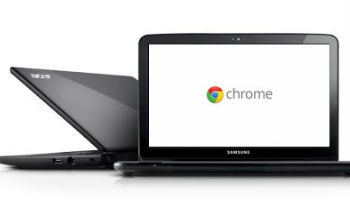

Google has launched a new feature designed to make Chromebooks easier to share among multiple users.
The search engine giant has been testing Chromebook-equipped store kiosks, to allow shops and businesses to help their customers and staff check stock, place orders, or even get more information while shopping or working.
The kiosks use something Google calls “Managed Public Sessions” to allow staff and customer use of the devices without the need for logging in, according to an 30 April post by Vidya Nagarajan, product manager for the Chrome for Business unit, on the Official Google Enterprise Blog.
“With easy personalisation and built-in security, Chrome devices were made for sharing,” wrote Nagarajan. “The new Managed Public Sessions feature delivers a highly customisable experience for both customers and employees without requiring a login.”
Some of Google’s suggested uses for the Chromebook kiosks include:
Chromebook notebooks and their desktop brethren Chromeboxes run Google’s Chrome operating system and feature a wide range of preinstalled, cloud-based Google services and products, including Google Docs and Google Calendar.
Google and its partner vendors who have built Chromebooks so far, including Samsung and Asus, have been pushing Chromebooks as Internet-connected devices that can be cheaper, faster and more nimble than traditional laptops and notebooks.
Chromebooks allow users to do their work online with less need for on-machine storage for large applications and files. One shortcoming, though, is that users need good connectivity to use their machines, and offline work can be a challenge, according to critics and reviewers.
At the same time, the machines can be inexpensive and well-featured devices that allow users to accomplish a wide range of tasks without the bloat and mass of a traditional laptop or notebook machine.
Consumers, however, haven’t been jumping aboard the Chromebook bandwagon in huge numbers, based on sales so far. In fact, several systems makers have released Chromebooks in the last year and they haven’t proved overwhelmingly popular with consumers, causing some vendors to retreat or try again with new machines that offer expanded features.
Page: 1 2
All Cybertrucks manufactured between November 2023 and February 2025 recalled over trim that can fall…
As Musk guts US federal agencies, SEC issues summons over Elon's failure to disclose ownership…
Moonshot project Taara spun out of Google, uses lasers and not satellites to provide internet…
Pebble creator launches two new PebbleOS-based smartwatches with 30-day battery life, e-ink screens after OS…
Amazon loses appeal in Luxembourg's administrative court over 746m euro GDPR fine related to use…
Nvidia, xAI to participate in project backed by BlackRock, Microsoft to invest $100bn in AI…